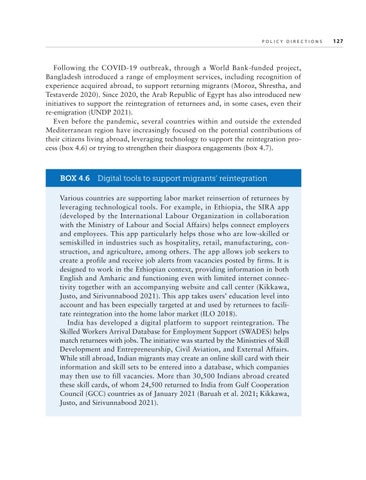P o l i cy D i r e c t i o n s
Following the COVID-19 outbreak, through a World Bank-funded project, Bangladesh introduced a range of employment services, including recognition of experience acquired abroad, to support returning migrants (Moroz, Shrestha, and Testaverde 2020). Since 2020, the Arab Republic of Egypt has also introduced new initiatives to support the reintegration of returnees and, in some cases, even their re-emigration (UNDP 2021). Even before the pandemic, several countries within and outside the extended Mediterranean region have increasingly focused on the potential contributions of their citizens living abroad, leveraging technology to support the reintegration process (box 4.6) or trying to strengthen their diaspora engagements (box 4.7).
BOX 4.6 Digital tools to support migrants’ reintegration Various countries are supporting labor market reinsertion of returnees by leveraging technological tools. For example, in Ethiopia, the SIRA app (developed by the International Labour Organization in collaboration with the Ministry of Labour and Social Affairs) helps connect employers and employees. This app particularly helps those who are low-skilled or semiskilled in industries such as hospitality, retail, manufacturing, construction, and agriculture, among others. The app allows job seekers to create a profile and receive job alerts from vacancies posted by firms. It is designed to work in the Ethiopian context, providing information in both English and Amharic and functioning even with limited internet connectivity together with an accompanying website and call center (Kikkawa, Justo, and Sirivunnabood 2021). This app takes users’ education level into account and has been especially targeted at and used by returnees to facilitate reintegration into the home labor market (ILO 2018). India has developed a digital platform to support reintegration. The Skilled Workers Arrival Database for Employment Support (SWADES) helps match returnees with jobs. The initiative was started by the Ministries of Skill Development and Entrepreneurship, Civil Aviation, and External Affairs. While still abroad, Indian migrants may create an online skill card with their information and skill sets to be entered into a database, which companies may then use to fill vacancies. More than 30,500 Indians abroad created these skill cards, of whom 24,500 returned to India from Gulf Cooperation Council (GCC) countries as of January 2021 (Baruah et al. 2021; Kikkawa, Justo, and Sirivunnabood 2021).
127

